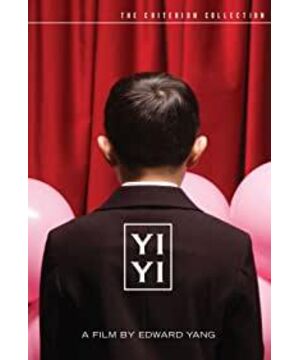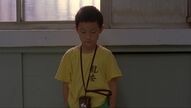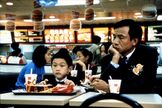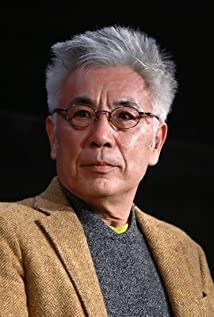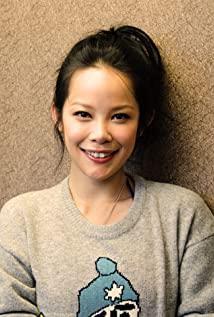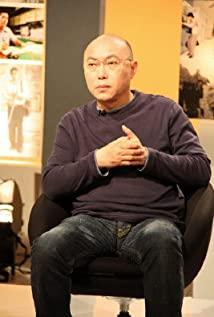Frames and Lenses
The main theme of Yang Dechang's films is the repression and alienation of urbanites. His film language expressing this motif can be called "the picture frame in the picture frame", that is, through the frame and lines on the screen to compress and restrain people's activity space, thus revealing the general psychological and spiritual state of modern people. Director Yang has used this technique frequently in films such as "A Day at the Beach", "Childhood Friends" and "Terrorist", and in "Yiyi", the application of the box has reached its peak. These "framed" elements can be walls, doors, windows, and screens, cramped corridors, posters large and small, criss-crossing railway networks and high-voltage power lines, or even crowds and shallow depths of field. In the passages showing NJ’s (Jian Nanjun) home many times, in a crowded room, the picture is still divided by walls, door frames and corridors. This closed, cramped and divided space is what makes this member confused, struggling and difficult to communicate. The best environmental footnote for extended families.
When Lily and Tingting went to the theater, the picture was cut and torn into gridded spaces by various lines in the Shopping Mall, implying Lily's irritable and messy mood after encountering her mother's promiscuous lover. Then in the fast food restaurant, Lily waits for the fat man who is late to come. In this shallow depth of field shot, Lily is surrounded by the brick wall in the foreground, the window frame, the long table and a group of noisy young people in the back, depressed and impatient. She finally couldn't help but explode. It is worth noting that among the young people, there are actually the protagonists of "Mahjong", Hongyu, Lun Lun and the Little Living Buddha. The names of the first two are exactly the same as those in "Mahjong". "Mahjong" was filmed in 1996, "Yiyi" was filmed in 2000, and the gangster who was less than 18 years old at that time grew up. Unfortunately, the sunny and shy Lun Lun in "Mahjong" has a rogue atmosphere. Urban Taipei is like a big sauce jar, polluting any beautiful human nature.
NJ flew to Japan on a business trip to meet Ari. In the hotel room, NJ sat on the tatami and kept smoking. This was his inner struggle. The background with extremely shallow depth of field was an entire wall decorated with grids, which trapped NJ like a prison. Next, the two talked. The porch they were in was less than a quarter of the horizontal space of the picture. NJ was forced into the shadow by Ari. The audience could no longer see him, and the rest of the picture was also dark. This The picture is a metaphor for the relationship between two married old lovers facing strong realistic and moral constraints, which reinforces NJ's emotional passivity and implies the fragility of this relationship.
When Tingting and Fatty were on a date to watch the show, the two of them were surrounded by other audiences, but the couple who were seated next to each other had a sense of distance visually. Leaning on the seat to the left, his expression was embarrassed. This state of detachment shows the illusory love between the two. What's more interesting is that the two players on the stage have a subtle correspondence with the fat man's ex-girlfriend Lily and his current girlfriend Tingting - one player plays the cello, the other plays the piano, Lily has been learning to play the cello, and Tingting has learned the piano. , Who is the fat man admiring?
"Yi Yi" lasts for more than three hours, with very few close-up and sports shots, and most of the shots are fixed shots of medium, panoramic, and even long-range shots. The camera is often fixed outside doors and windows, and the lens is often in a cool, onlooker angle. Because it is a closed structure, the fixed camera has very high requirements on the director's scene scheduling skills and the richness of information in the scene frame. Yang Dechang is just a master. For example, in the chaotic section of the banquet celebrating Ah Di's son, the parties Yun Yun (A Di's ex-lover) and Yanyan (A Di's wife) were quickly squeezed out of the visual focus and even out of the picture, while more than ten However, a relative and friend overwhelmed the guest and made a big fight, even hurting Adi. Due to the complex character relationships and frequent physical contact, the audience will not feel dull at all in this semi-fixed shot, and the director uses this to express the complicated family life in which urban culture and traditional family and friends are intertwined.
Another wonderful set of fixed shots is the NJ family taking turns talking to her comatose mother-in-law. Because the mother-in-law could not respond, everyone dared to tell the truth. The camera is fixed on the bedside of the mother-in-law, and the narration to the camera is like a monologue on the stage of the drama, and the audience behind the camera can easily identify with the character. A more intense fixed shot of this experience is NJ's wife Minmin crying and saying that she seems to have lived in vain, like a fool.... Whenever it comes to the emotional part, Minmin's eyes almost look directly at the camera (this is generally taboo in the movie), as if talking to the audience face to face, and the mirror behind her reflects her back, giving the audience a glimpse It feels like seeing her most real inner things, and the audience has a strong sympathy for Minmin's emotional and psychological state.
The metaphor of
glass window As a product of industrial civilization, glass itself has a certain symbolism. For movies, glass can block and isolate, transparency can spy on others, and reflection and refraction can be reversed. Using glass windows as props, you can get colorful image effects and profound meaning and purpose. In the first feature film "A Day at the Beach", the use of glass reflects Yang Dechang's unique ingenuity. Ali, who ran out of Awei's car angrily, scurried along the street, and in the background was a row of glass windows displaying products. The city's rich and dazzling material choices contrasted with Jiali's loneliness and disappointment, but at that time, Yang Dechang's method Still young.
When it comes to "Yiyi", the use of glass windows has been freely used. All the executives, including NJ, sat in the car and discussed the crisis facing the company. The high-rise buildings tilted and reversed and floated on the glass windows, which visually emphasized this sense of crisis. In the office, Minmin stared in fascination, and the glass windows showed that Taipei's urban night scene merged with the office space, creating a gloomy and alienating effect, while Minmin in the middle seemed confused and helpless. This delicate and moving lens reveals the theme of the plight of modern people in the city.
NJ's attitude towards Ari's request to reunite is ambiguous. On the train back to Tokyo, Ari showed an expression of indifference and disappointment. The blurred scene passing by the glass window symbolized that the love between Ari and NJ was irreversible. At this time, NJ fell asleep. He has always been emotionally slow and passive, and he didn't know that Ari had made a decision. Ari later learned that NJ had never loved another person, and under the shadow of the dark skyscrapers and dark rooms reflected from the hotel windows, she burst into tears, full of remorse. The loss and hopelessness of modern people's love are mixed feelings.
Combining sound and picture with
film is an audio-visual art, a comprehensive application of image and sound. Most film directors do not feel that they pay too much attention to the shaping of the light and shadow of the picture, ignoring the expressive power of sound alone or organically combined with the picture. Yang Dechang attaches great importance to the use of sound. In addition to creating a sense of reality, opening up space outside the painting, and expressing the mood of the characters through music, Yang Dechang creatively uses sound to connect multiple related pictures, forming a unique and ambiguous tension between the picture and the sound. In "Terrorist", he has used such a means of expression: the literary girl "shares" a suicide monologue with the Taimei, the literary girl is really committing suicide, and the Taimei is just lying on the phone. The most typical thing in "Yiyi" is that the sound accompanying the baby's B-ultrasound screen is an introduction to a new game with life. The next screen is that the executives of NJ's company are listening to a speech by Japanese game designer Ota. The sound originally It is the Chinese translation of the speech. Through this sound clip, the connection of two different images with internal connection is amazing and reasonable, and in Daejeon's words, one of the main themes of the film - the examination and reflection of life.
Another excellent use of voice is in the discussion of Daejeon's idea. On the screen, the executives feel that Daejeon's idea is expensive and unrealistic, and they want to find someone to copy Daejeon's products. NJ keeps a distance from them and looks at Daejeon through the glass window. . The next scene is that Daejeon is amusing with the pigeons, and the off-screen dialogue rang out. Da (the chairman) asked the honest man NJ to pretend to send Daejeon away. NJ said angrily, "You can pretend to be sincere, you can pretend to be honest, you can pretend to make friends. , you can pretend to do business, what else is true in this world?" In this paragraph, NJ, Daejeon and company executives form a strong contrast. The former two are real, frank, and natural people, while executives It has been tainted with hypocrisy and mercenary by business culture. It was in the interaction with Daejeon that NJ gradually reflected on the meaning of work, survival and life.
There are many wonderful examples of creatively demonstrating the combination of sound and picture. For example, the indoor close-up shot Minmin is crying, and NJ answers the question. The next shot is of Lily's mother and lover arguing next door, and then the picture goes back to NJ's house (the shot is outside the window), the lights are turned off, and the night sky is reflected on the glass window. The cries and quarrels became more miserable and harsh in the dark night adorned with sparse lights. A similar technique is also used in "Mahjong". "Hong Kong", which regards women as playthings, is "shared" by Angela, a woman from Hong Kong, and her female partner. He vomited and wailed in front of the three women, and the cry continued from indoors to Taipei. The great vistas of the night, the personal pain magnified into the grief of the whole city.
NJ relives old dreams with Ari in Japan, and Tingting is dating a fat man. The pictures are constantly switched between the two generations of lovers, and the dialogue voices of NJ and Ari are seamlessly embedded in the two sets of shots. It is a beautiful and moving mirror structure with an oriental sense of reincarnation and destiny. This parallel montage is Yang Dechang's masterpiece, and it is not much less than the classic movie history in "The Godfather" where prayers are accompanied by church baptisms and bloody assassinations. Introspective
dialogue and philosophical lines are a major feature of Yang Dechang's films.
In his later films "Age of Independence" and "Mahjong", these didactic dialogues and monologues are often too much and too direct, and even provocative, especially "Age of Independence" was criticized for this. The dialogue in "Yi Yi" is just right, indispensable for shaping the characters, driving the plot, and expressing the film's theme. The naive and curious Yangyang's monologue at her mother-in-law's funeral is the highlight of the film. The last sentence "I will remember that you often tell me that you are old, and I want to tell him that I think I am old too. "Most touching. "Why we are all afraid of the first time, every day is the first time" said by Daejeon is an interpretation of the movie's title "Yiyi", while Minmin said, "Why do you tell Mom the same thing, I talk about it every day. To be exactly the same” seems to open up the meaning of “one by one” from the opposite angle—repetition day after day.
Fatty has said a lot of good things to Tingting, and the most appreciated by fans is that "after the invention of movies, human life has been at least three times longer than before"; but he also said, "We all know what murder is all about. , and have had several experiences of various murders." As a prophecy, the fat man later killed Lily's English teacher. The fundamental difference in understanding of the film in the dialogue between Tingting and Fatty also indicates the inevitable ending of their love.
The personalities are very different, and the lines of Minmin and NJ who do not understand each other are even more hidden. Minmin believes that life is very simple. From the beginning, she said to Yun Yun, who came to the wedding scene, "It's not that complicated." When talking with colleagues about her mother-in-law's illness, she said, "It's not that complicated." Her comprehension is still "this lot is really not that complicated", while NJ explained to Adi that her mother-in-law was sick and said "it's not that simple", the values of the husband and wife are very different, and it is easy to speculate that they are not because of other details. Marriage in love, which paved the way for what NJ said to Arui later, "I have never loved anyone else in my life." After experiencing all kinds of changes, NJ and Minmin's understanding of life turned out to be the same - life is no different, but it's just repetition. We may understand it this way, these cleverly conceived lines show that the repressed and fragmented life of modern people has been flattened and lifeless.
In Yang Dechang's urban-themed movies, if "Terrorist" is cold and fierce, "Mahjong" is anxious and angry, and "Yiyi" is sharp and distant. In the film, Yang Dechang made the most of his iconic film techniques, and with a compassionate attitude, calmly and introspectively expressed his concern for the living conditions and predicaments of modern people, reflecting the profound humanistic consciousness and the speculative attitude of intellectuals. The film's genius-like creative play on audiovisual language has won recognition and praise from all over the world for Yang Dechang's directing talent. His influence on Chinese language and even Asian films has not diminished in the slightest due to his early death, but has lasted longer and has become more profound.
View more about Yi Yi: A One and a Two... reviews


